May 19, 2025 | 21:11 GMT +7
May 19, 2025 | 21:11 GMT +7
Hotline: 0913.378.918
May 19, 2025 | 21:11 GMT +7
Hotline: 0913.378.918
In Dac O commune (Bu Gia Map district), Binh Phuoc's pepper capital, pepper gardens were planted about 20 years ago but are still very lush and highly productive. The households owning these peper gardens are all members of the Binh Phuoc Organic Agriculture Cooperative; all gardens are cared for in the same process according to European organic standards. Thanks to that, people still "live well" despite erratic weather, pest damage, and unstable prices.
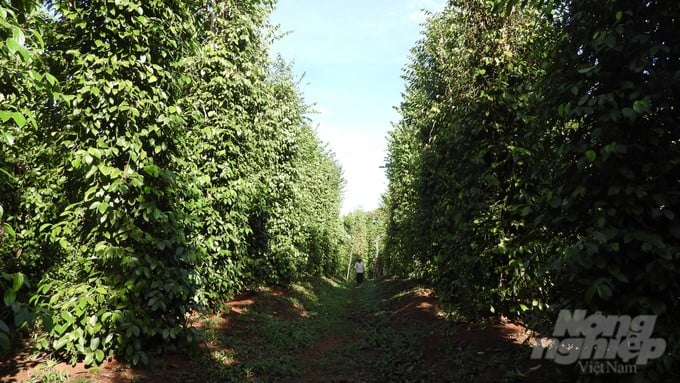
Everyone admires the lush pepper garden of Mr. Nguyen Van Luan (Dac O commune, Bu Gia Map district, Binh Phuoc). Photo: Tran Trung.
Mr. Nguyen Van Luan, one of the core members of the Binh Phuoc Organic Agriculture Cooperative, said that previously, his family cultivated pepper in a traditional way, mainly using chemical fertilizers to fertilize the garden. Over the years, he realized that the soil was hardened and pests and diseases became more and more difficult to treat, not to mention that the use of many chemical fertilizers and pesticides also affected the health of himself and his family.
Therefore, from very early on, Mr. Luan converted the entire pepper garden from traditional cultivation to safe production and aimed at meeting organic standards. Accordingly, to have approximately 3 hectares of pepper certified European organic as of today, Mr. Luan spent 5 years converting the pepper production method from traditional production to safe production and another 3 years from safe pepper to organic pepper.
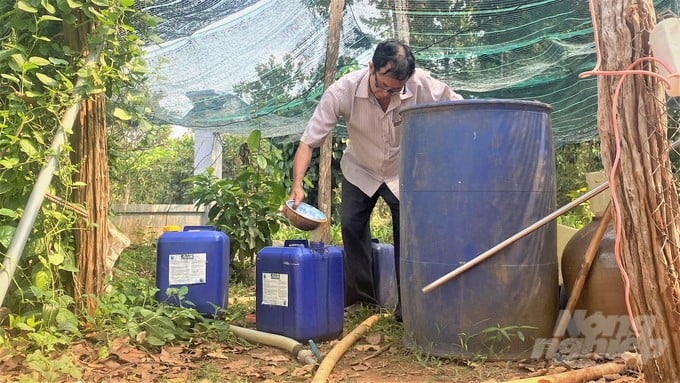
Mr. Nguyen Van Luan shares the secret to composting IMO products. Photo: Tran Trung.
According to Mr. Luan, in the first years of conversion, he encountered many difficulties with the situation of "bottoming out" pepper because pepper prices entered a period of recession, and productivity initially decreased sharply from 2.5 tons/ha to less than 1 ton/ha. However, the land does not betray the people. In the last 3 years, the quality of pepper from his garden has always met the requirements for more than 900 active elements that must be analyzed according to European organic standards. Pepper productivity is even higher than before; the selling price of pepper is also 40% higher than the market price, while production costs are greatly reduced.
"Growing organic pepper is not difficult. Many people mistakenly think that they must use chemical fertilizers and pesticides to treat pests and diseases effectively, but that is wrong thinking. As long as the soil is healthy, the plant is strong and can self-resist pests very well," said Mr. Luan.
In addition to strictly following the Cooperative's procedures, Mr. Luan is considered an "innovator" and a pioneer in producing organic fertilizer from indigenous microorganism (IMO) products to fertilize his family's garden. Reality shows that this type of product is low-cost but highly effective, so many members and people in the area follow him.
"To take care of the garden effectively, the only way is to make IMO products. Therefore, I take advantage of all the by-products available at home, such as banana, papaya, avocado, jackfruit, vegetables, etc., and add probiotics to mix and compost in a drum for about 7 days to create the original IMO product," Mr. Luan shared.
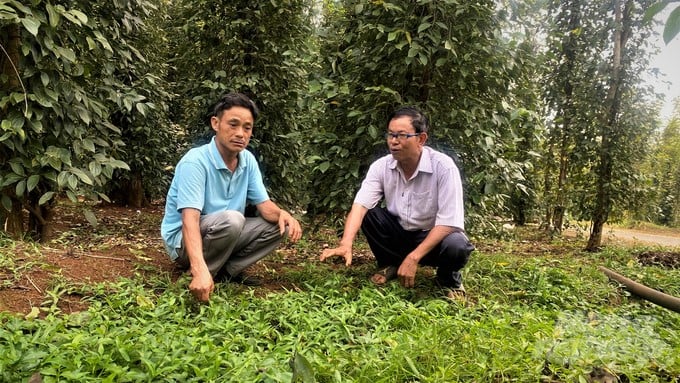
Mr. Nguyen Van Luan (right) shares secrets to organic farming with cooperative members. Photo: Tran Trung.
According to Mr. Luan, after successful incubation, he mixed the original IMO product with molasses, rice bran, and water at a ratio of 1/10. By using IMO products, his family only spent more than VND 10 million/ ha /year to fertilize the plants. The cost will gradually decrease each year as the nutrients in the soil accumulate. Currently, his family's investment costs are reduced to about VND 30 million/ ha /year. Meanwhile, in the past, when he used chemical fertilizers, the investment cost was at least VND 100 million/ha/year, not to mention adding manure. It is important that, from the day organic farming is applied, the health of everyone in his family is always guaranteed.
"It is the work of returning to the soil the things that people have taken away for bread and butter over the past decades. The good thing is that the movement towards organic pepper production is increasingly spreading, and this will certainly be a mandatory path towards sustainable pepper production," Mr. Luan said.
Although newly established and put in operation for more than 3 years as a clean pepper production club, Binh Phuoc Organic Agriculture Cooperative has initially achieved success in production and business.
Mr. Mai Hien Huy, Director of Binh Phuoc Organic Agriculture Cooperative, said that the Cooperative currently has nearly 100 members, of whom 29 members with a total area of approximately 60 hectares of pepper have been certified organic. The remaining area of hundreds of hectares is also maintained in production according to organic and sustainable standards (RA).
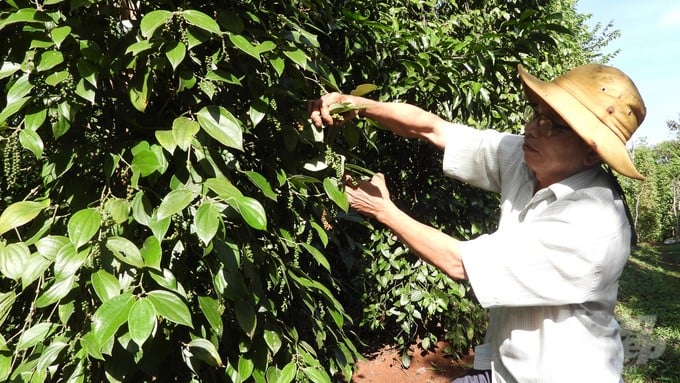
To have today's organic pepper garden, Mr. Luan spent over 8 years of persistent pursuit. Photo: Tran Trung.
Thanks to standard production, the Cooperative is a partner of Nedspice Processing Vietnam Company Limited (Nedspice Company). The Cooperative's products are purchased by the company right at the garden at a price 20% higher than the market price for organic pepper and 5% higher for safe pepper.
With the wish to bring Binh Phuoc organic pepper around the world and realizing the great potential of organic pepper, in 2023, the Cooperative decided to proactively invest over VND 200 million to complete procedures to apply for organic pepper certification according to European standards.
"With the motto 'going far, going together', we evaluate the organic certification for the Cooperative as a whole, not for each individual farmer household. When analyzing over 900 banned active elements, if a household is detected to have chemicals during the inspection process, they will be eliminated immediately. At that time, the whole Cooperative had to bear the loss. Therefore, member households in the Cooperative always have a very deep awareness of complying with the organic production process," Mr. Huy shared.
According to Mr. Huy, being granted organic pepper certification has helped the Cooperative be more proactive in production. Product consumption is also more flexible and not dependent on fixed markets. "Since achieving the independent certification, more and more partners wish to order pepper in large quantities. The Cooperative is developing a production and business plan to partly meet order demand by expanding the scale of organic pepper production, diversifying products, and focusing on deep processing," Mr. Mai Hien Huy said.
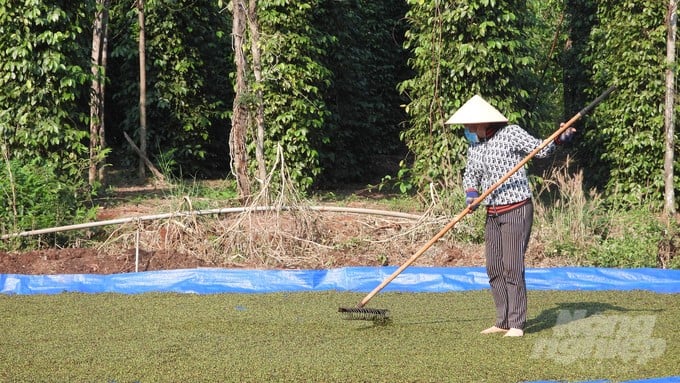
Linkage to produce pepper according to international standards is a trend among pepper-growing households in Binh Phuoc. Photo: Tran Trung.
According to Mr. Tran Van Phuong, Deputy Director of the Binh Phuoc Department of Agriculture and Rural Development, linkage to produce pepper according to international standards is a trend among pepper-growing households. Because no chemical fertilizers or medicines are used, pepper production costs have been significantly reduced, while the selling price is much higher than that of conventional products.
Especially through the production process, farmers said that organic farming has contributed to protecting their health because they no longer have to contact and use chemicals. At the same time, thanks to the application of organic production processes, the environment is also fresher.
"The ultimate result of organic agriculture is that nature is peaceful, diverse, and complementary, and people from generation to generation enjoy symbiosis with the good values that nature gives. Agricultural businesses and even farmers in remote and border areas of Binh Phuoc are aiming for that goal," Mr. Tran Van Phuong emphasized.
Translated by Thu Huyen

(VAN) Minister of Agriculture and Environment Do Duc Duy held a meeting with Soopakij Chearavanont, Chairman of C.P. Group, on May 15.
/2025/05/16/3800-0-nongnghiep-143756.jpg)
(VAN) Suntory PepsiCo Vietnam coordinated with the Ministry of Education and Training to implement an education program on water conservation, reaching nearly 1 million primary school students nationwide.

(VAN) Vietnam’s TH Group officially put its high-tech fresh milk processing plant into operation in the Russian Federation, marking a historic moment as the first TH true MILK cartons were produced in Russia.

(VAN) Use of high-quality broodstock and biotechnology is regarded as the most effective approach to ensuring sustainable and economically viable shrimp aquaculture ahead of climate change and the emergence of increasingly intricate disease patterns.

(VAN) Carbon farming is a form of agricultural practices that helps absorb more greenhouse gases than it emits, through smart management of soil, crops, and livestock.

(VAN) This is a key content of the Memorandum of Understanding recently signed between the Vietnam Fisheries Society and Kunihiro Inc of Japan.

(VAN) To achieve the goal, local authorities and businesses in Kon Tum province have fully prepared the necessary conditions for the new Ngoc Linh ginseng planting season.